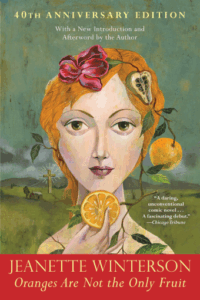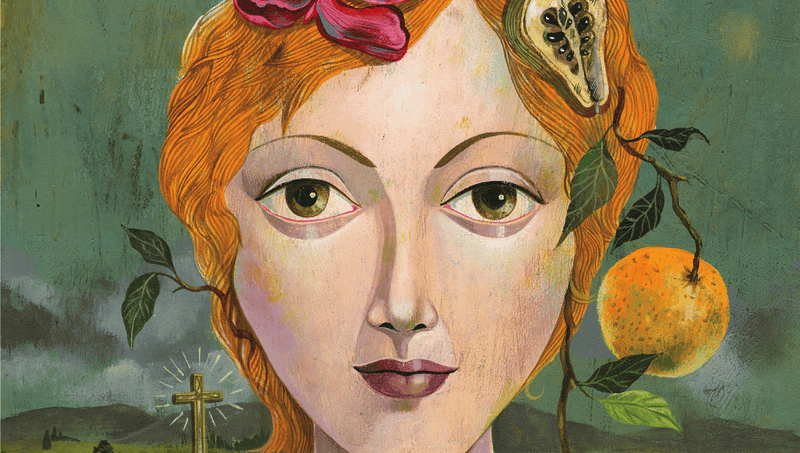Earlier this month was my birthday. Such dates are more than times of celebration. They are memory-markers.
Article continues after advertisement
Where we were. Who we were with. How did it feel?
This year, 2025, I had a different birthday too. The 40th anniversary of the publication of my first novel, Oranges Are Not the Only Fruit. That was the beginning of my life as a writer. Being brought up deeply religious, it does matter to me that the wonderful idea of being twice-born—once of water (blood, the flesh) and then of the Word (the spirit) is the perfect image for a writer.
Oranges is a novel where I get twice-born in more ways than one. I used my own name to make myself into a fictional character. An avatar of myself. When you are adopted you endlessly feel you have more than one self—the “other” you is living the life you would have lived with the other parents in the other place. As a writer, the strange sense of multiple selves is something that happens regularly. We can only create from what we are. And what we are is not one thing.
In Oranges, I wanted to draw on my experiences, and to build out of those experiences an imaginative place where other people could go.
The mistake is to think that what we are is made out of what we experience—and our experience of what we experience. That’s true. There is the objective happening and the subjective response. That response is complicated. And not a little based on…
What we can imagine. About ourselves. About the world. How to turn What Is into What If?
That’s more or less the basis of my next book: One Aladdin Two Lamps.
Human totality is more than the sum of the parts. We are more than what happens to us. In Oranges, I wanted to draw on my experiences, and to build out of those experiences an imaginative place where other people could go. People whose lives were far away from mine. Otherwise, what was I writing? It’s just a diary. And a diary you write for others to read…is either exhibitionist or insincere. I wasn’t interested in that. Am not now.
From the start, I was clear that what I was writing was fiction. Clear that the Jeanette in the story wasn’t the faithful facsimile of the JW writing the story. It was hard to get that message across back in 1985. Especially when the assumption was that women wrote social realism and confessional and any “experiment” was a male thing. At that time, writers such as Angela Carter or Kathy Acker were oddballs. Virginia Woolf had no reputation outside of a small circle of specialists. She hadn’t been taught on my Oxford degree course. She was considered (by men) a minor writer. Yes, that it true!
So it was difficult for me to find a writing home for myself. But then, I figured, I didn’t have a home of any kind, so why worry? Build one!
Finding a way to Not-Write is as important as finding a way to write.
By which I mean, the gravitational pull of assumption, tradition, prejudice, fashion, the whole giant mass of the way things are, is a huge force compelling any writer not to find out how they want to write or what they have say. Just going in the opposite direction means nothing. Posturing means nothing. Rebelling means nothing. Those templates are well-known. Ducking underneath the force-field is not so easy. Especially when the rewards are there for those who don’t.
It’s harder now, I think. I mean, what is the point of me writing on Substack when I could post a video of my cat and get a million hits on Tik-Tok? Or I could write some garbage about a place I couldn’t less about and have you traipsing off to view it on the weekend, while paying me for the non-experience.
There is also the seduction of turning any proto-insight into a commodity. Oversharing is a problem! It takes time for any insight, any idea, to settle into the existing place that is you. To dock there, to transform into a synthesis of You+Insight. The rush to say something, to write something, turns insight into impulse.
My best advice to you is to wait. Work with whatever it is by yourself, or if it’s collaborative, with the people you trust.
Value things a little more. Exploit things a little less.
Capitalism has taken over our Souls. We strip-mine ourselves and wonder why we feel so empty? That’s not what creative work is about.
Now, of course if you are writing a weekly column or whatever, you have to get on and do it. Whether it’s superficial or deeper will depend on whether you are superficial or deeper. There is a lot of money to be made out of being superficial. That’s ok by me. It’s just that it’s not of any interest to me—as a reader or as a writer. We make our choices. But beyond the call of the regular, which is good for discipline (unless it’s the kind of compulsive quick-fire garbage Trump prefers) there is what you, personally, want to work on. The verb here being “work.” The kind of work that is worthwhile. That’s not instant noodles.
The past is gone, but the past is how we learn. The past is how we got here. It’s worth a celebration.
I guess that over the last 40 years, where I have written in most forms, and written to order, written to commission, written to time, taken writing jobs to pay the bills, and so on, I have learned to keep aside what matters most. To get on with my “big project” quietly and not share it at all until it is done. Then I can discuss it. Then I can take notes. Then I am ready to hear whatever anyone wants to say. There’s a point where the dream-world crosses the threshold into daytime. And that’s how it should be. We relate to each other. We offer what we can to others. We don’t sit on our treasure like a dragon. We don’t bury it in the sands of our own self-regard. We are not so feeble that we can’t take a blow.
I have taken so many blows. Had a lot of trouble with my work over the years. Had my personal life mocked and trashed. Been dismissed by the same media that now calls me a National Treasure. Well, who cares? I did at the time! It’s hard and horrible and it hurts. That’s when it matters to be able to sit faithfully and quietly with the thing you wanted to make, with what you wanted to say, and how you wanted to say it.
The memory-points are there to help and guide.
Forty years is a long time. But only if it remains an alive time. Yes, the past is gone, but the past is how we learn. The past is how we got here. It’s worth a celebration. Even when it all went wrong. Especially when it did not. Creatively, we move outside of any straight lines. Time’s arrow is not relevant. What moving through time has revealed to us is relevant.
If you are new to creative work, honor your choice. Start the memory-points now. What you will look back on. You won’t go back…we can’t…but humans have memory for a reason, and it’s not just to know where we buried the food-hoard. You are not a squirrel!
And for those of you who have work out there, well done! Celebrate! It’s not vanity. It’s acknowledgement. This is what you did.
Humans are memory, invention, and hard work. In every sense.
*
A version of this essay first appeared on Jeanette’s Substack, “Jeanette Winterson: Mind Over Matter”
__________________________________

Oranges Are Not the Only Fruit (40th Anniversary Edition) by Jeanette Winterson is available from Grove Press, an imprint of Grove Atlantic.
